The 2020 Mac Mini Unleashed: Putting Apple Silicon M1 To The Test
by Andrei Frumusanu on November 17, 2020 9:00 AM ESTBenchmarks: Whatever Is Available
As we’ve had very little time with the Mac mini, and the fact that this not only is a macOS system, but a new Arm64-based macOS system, our usual benchmark choices that we tend to use aren’t really available to us. We’ve made due with a assortment of available tests at the time of the launch to give us a rough idea of the performance:
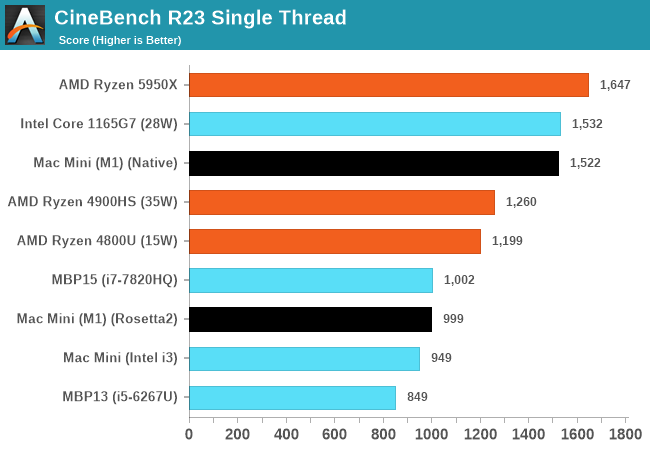
One particular benchmark that sees the first light of day on macOS as well as Apple Silicon is Cinebench. In this first-time view of the popular Cinema4D based benchmark, we see the Apple M1 toe-to-toe with the best-performing x86 CPUs on the market, vastly outperforming past Apple iterations of Intel silicon. The M1 here loses out to Zen3 and Tiger Lake CPUs, which still seem to have an advantage, although we’re not sure of the microarchitectural characteristics of the new benchmark.
What’s notable is the performance of the Rosetta2 run of the benchmark when in x86 mode, which is not only able to keep up with past Mac iterations but still also beat them.
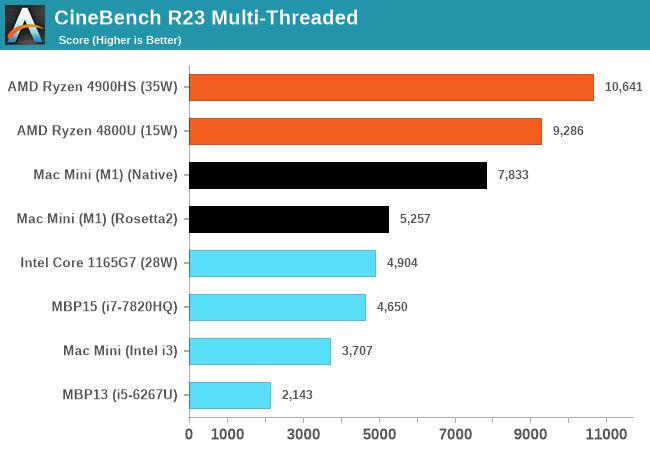
In the multi-threaded R23 runs, the M1 absolutely dominates past Macs with similar low-power CPUs. Just as of note, we’re trying to gather more data on other systems as we have access to them, and expand the graph in further updates of the article past publishing.
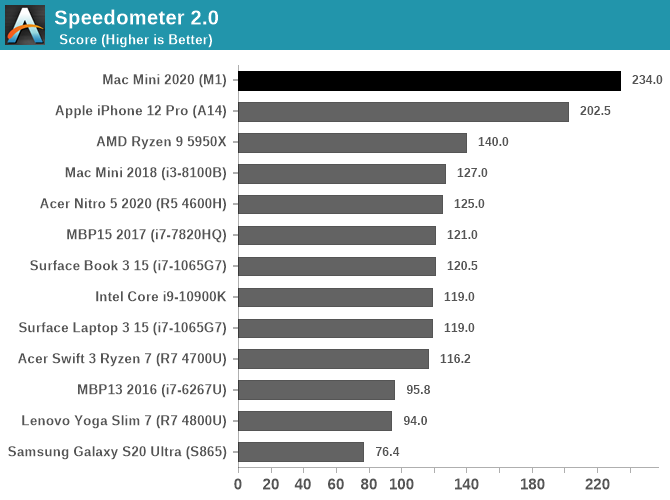
In browser-benchmarks we’ve known Apple’s CPUs to very much dominate across the landscape, but there were doubts as to whether this was due to the CPUs themselves in the iPhone or rather just the browsers and browser engines. Now running on macOS and desktop Safari, being able to compare data to other Intel Mac systems, we can come to the conclusion that the performance advantage is due to Apple’s CPU designs.
Web-browsing performance seems to be an extremely high priority for Apple’s CPU, and this makes sense as it’s the killer workload for mobile SoCs and the workload that one uses the most in everyday life.
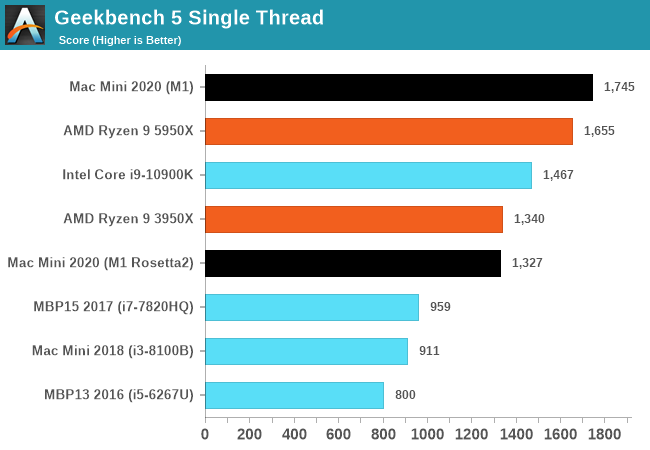
In Geekbench 5, the M1 does again extremely well as it actually takes the lead in our performance figures. Even when running in x86 compatibility mode, the M1 is able to match the top single-threaded performance of last generation’s high-end CPUs, and vastly exceed that of past iterations of the Mac mini and past Macbooks.
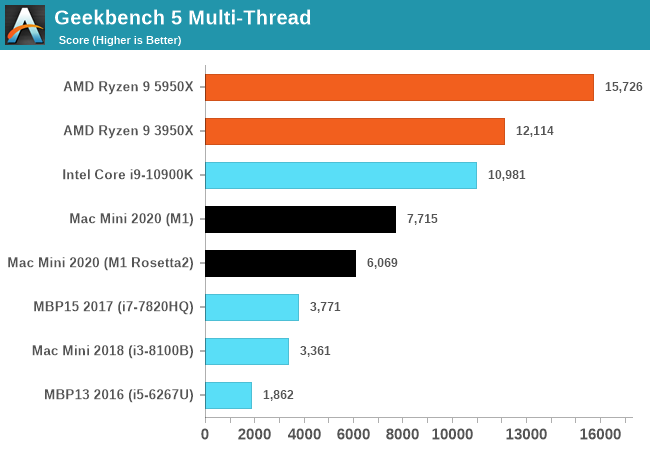
Multi-threaded performance is a matter of core-count and power efficiency of a design. The M1 here demolishes a 2017 15-inch Macbook Pro with an Intel i7-7820HQ with 4 cores and 8 threads, posting over double the score. We’ll be adding more data-points as we collect them.


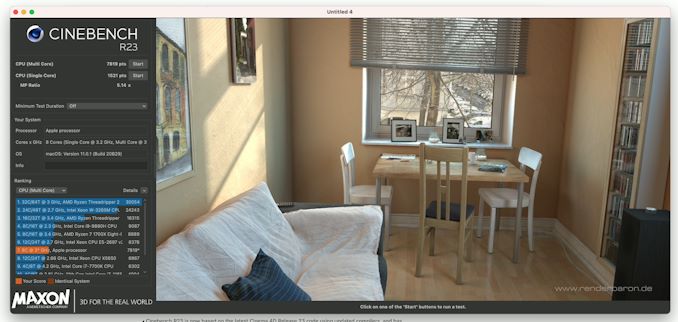








682 Comments
View All Comments
Zagor Te Nay - Sunday, November 22, 2020 - link
Unrelated to how good M1 is - and I think it is really darn good, and will only get better as devs start supporting it natively (although Rosetta 2 seems to be doing fine, all considered) - Intel is not hard to beat. AMD has done it with having much less money than Apple has.As someone said, Intel has stagnated themselves out of competition. They are more responsible for their own sad current situation than AMD or Apple, really.
Spunjji - Monday, November 23, 2020 - link
@Zagor Te Nay - I don't think the fact that AMD have finally clawed out a lead over Intel indicates that they're easy to beat.Nvidia had a crack at CPU design a while back and were forced to pack it in. Samsung have tried to out-engineer Apple with large ARM core designs and have failed. It's not clear whether Qualcomm can't compete or can't be *bothered* to compete, but they've never come within a year of Apple's designs and are usually around 18 months behind.
These are all large, wealthy, serious organisations. To be honest I'm impressed by Apple, and even more so by AMD.
beowulfey - Tuesday, November 17, 2020 - link
I mean, the point of benchmarks is to compare CPUs that are available today, right?In the hypothetical future where Zen 4 is comparable to an M1, I would counter that by then the latest Apple M3 or whatever will have improved as well, so...
Tams80 - Tuesday, November 17, 2020 - link
But Zen 2 is roughly comparable to the M1.No one is claiming that other future processors will only match the M1. Well, perhaps other than you in your imagination.
halo37253 - Tuesday, November 17, 2020 - link
M1 is slower than 4800u when it comes to multithread workloads. Even on these video compression tests.... While using slightly more power at most. 22watts vs 25watts while running cinebench...Zen3 mobile will be out before M2, and will most likely have no problems matching or beating M2 in nearly any task while using same amount of power. While being 7nm
Only reason why M1 is even remotely impressive is largely thanks to 5nm. Apple managed to compete with Zen 2 in terms of power efficiency with 5nm, even though Zen 2 is 7nm. This M1 chip is no more impressive than the 4800u in terms of Performance/watt. M1 just has higher single thread vs weaker multi thread....
Spunjji - Tuesday, November 17, 2020 - link
@halo36253 - have to disagree with you on that part. A 5nm process does not magically make a 3.2Ghz CPU act like one boosting north of 4Ghz. M1 is particularly impressive for power draw, which has a lot to do with that process, but it's also quite fast in its own right. Beating out Intel and duelling with a newly-resurgent AMD is an impressive showing for their first SoC designed for anything more than an iPad.It's also impressive that it is even on 5nm in the first place. It would have taken lots of work between designers and the foundry to pull that off a year before AMD will make the move.
halo37253 - Tuesday, November 17, 2020 - link
I probably was a little too critical.Yes the M1 deserves all the praise it can get. But some of that praise should be on TSMC, they are on fire. TSMC and Samsung have leapfrogged Intel. And Honestly if Intel's Fabs were able to keep up, this move to Arm would have been more questionable. I too think it made more sense to go with their own chip than risk the mac lineup with AMD processors.
I just wonder how well they can scale their Arm chips of, if they ever do. As if they ever really want to transition the Macbook pro 16, iMac or Macpro We need a Ryzen competitor. Intel was already behind in there areas and users have been wanting a high core count Mac for a long time now. Sadly the idea of running VMs on a Mac is looking grim.
Apple's Silicon is just what I figured it would be when it was allowed to actually suck power and stay cool. While the 22-25watt wall is most likely firmware enforced to keep the chip from pulling more power than designed for. GPU and CPU performance is top notch. This is what Arm should be. Now only if Apple and MS would work together to get windows for ARM working in bootcamp.
I just hope we one day see a 8-16 core M series chip from apple only packing high power cores. I'd love to see a ARM chip with a TDP of 65-95watts that doesn't consist of 100 cores.
Many people have been under the spell that Apple's silicon is somehow magically leagues above everyone else. They are no doubt good, and do give AMD a run for their Money. Funny to say that both AMD and Apple are making Intel look bad.
I've been wanting a ARM laptop for a long time now TBH. And been putting off getting the Wife a Macbook till these new ARM chips hit the market. Now I just need to hope MS works with Apple on getting Windows onto this. As as soon as windows for ARM allows for x64 apps to run, windows would be the choice for getting games running on these devices.
chris.parker@flipingreat.com - Tuesday, November 17, 2020 - link
Why Windows... ??? All apps can run Arm, windows is not something you run, its a desktop, that I personally practically never use. Applications, now that's what I use. MS has announced a native Arm M1 version of Office, and I am in 100%tuxRoller - Tuesday, November 17, 2020 - link
Oh yeah, this is far less critical🙄Eric S - Tuesday, November 17, 2020 - link
TSMC has been doing very well. Although remember that a lot of their work is financed by a cash infusion from Apple.